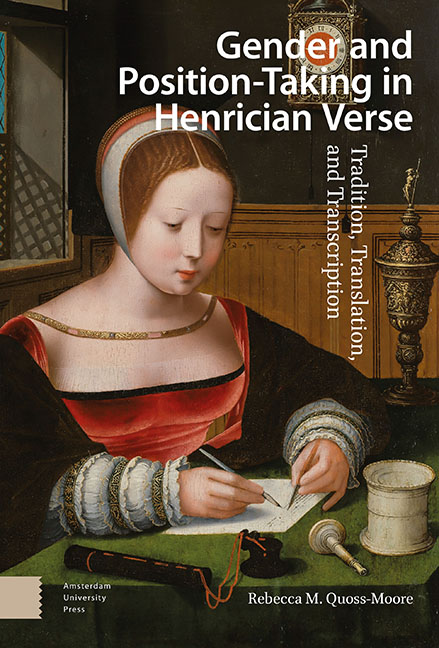Book contents
- Frontmatter
- Table of Contents
- Acknowledgements
- Introduction
- 1 Early Verse Position-Taking in the Henrician Court
- 2 Traditions of Resistance and Verse Position-Taking
- 3 Translation and the Position-Taking Verse Tradition
- 4 Men’s and Women’s Approaches to Translation and Authority in the Late Henrician Court
- 5 Transcription as Translation: Writing the Language of Manuscript Poetry
- 6 Resistance and Unity in the Douglas-Howard Exchange
- Conclusion
- Bibliography
- Index
1 - Early Verse Position-Taking in the Henrician Court
Published online by Cambridge University Press: 13 February 2024
- Frontmatter
- Table of Contents
- Acknowledgements
- Introduction
- 1 Early Verse Position-Taking in the Henrician Court
- 2 Traditions of Resistance and Verse Position-Taking
- 3 Translation and the Position-Taking Verse Tradition
- 4 Men’s and Women’s Approaches to Translation and Authority in the Late Henrician Court
- 5 Transcription as Translation: Writing the Language of Manuscript Poetry
- 6 Resistance and Unity in the Douglas-Howard Exchange
- Conclusion
- Bibliography
- Index
Summary
Abstract: In this chapter, considerations of Henry’s use of verse as an outlet for political self-assertion join with analysis of his increasing centralization of power as a radical act, considering the two together as context for reactive verse work from Henrician courtiers. The increasing emphasis on the monarch as the source of power and privilege created restrictions under which courtiers chafed, but Henry also assigned particular privilege to courtly poetry, establishing its power as a fact of court life and so creating one of the outlets through which courtiers resisted those restrictions. Skelton’s work offers one entry in the early establishment of the position-taking power of verse, infused with the choices established by the King for privileging and coding such position-taking.
Keywords: Henry VIII; John Skelton; Henrician verse; early Tudor poetry; courtly love lyric
In January 1510, Henry VIII surprised his new queen and her ladies, ‘appearing unannounced in her Chamber at Westminster with ten of his companions dressed as Robin Hood’s men’. Detailing the innovations of the performance, W.R. Streitberger notes the ‘elements of breaching ordinary decorum, concealed identity, and surprise’. Henry’s personal participation in the masque reflected the larger influence of his personality on all elements of court life and, ultimately, on England. Henry emphasized, through his early masques, his spontaneity, youth, and ostensible accessibility. At the same time, as Streitberger adds, ‘as the head of a household that governed the realm, his ceremonies, spectacles, and revels were public and so expressed the character of the state itself’. Henry was changing the particular investment of interest reflected in the masque; as Streitberger argues, speaking specifically about the revels of 1510, ‘the interests of prestige diplomacy were being served, but the manner of their presentation, emphasizing participation by the King and his friends, personalized diplomacy in a manner calculated to overwhelm’. Thus, in these early masques, Henry set the tone of his new administration through the performance that would come to be seen as an essential characteristic of Tudor monarchy. Seen through this lens, the King’s control of the masque emphasizes his aims to expand his control more generally.
- Type
- Chapter
- Information
- Gender and Position-Taking in Henrician VerseTradition, Translation, and Transcription, pp. 29 - 60Publisher: Amsterdam University PressPrint publication year: 2023



